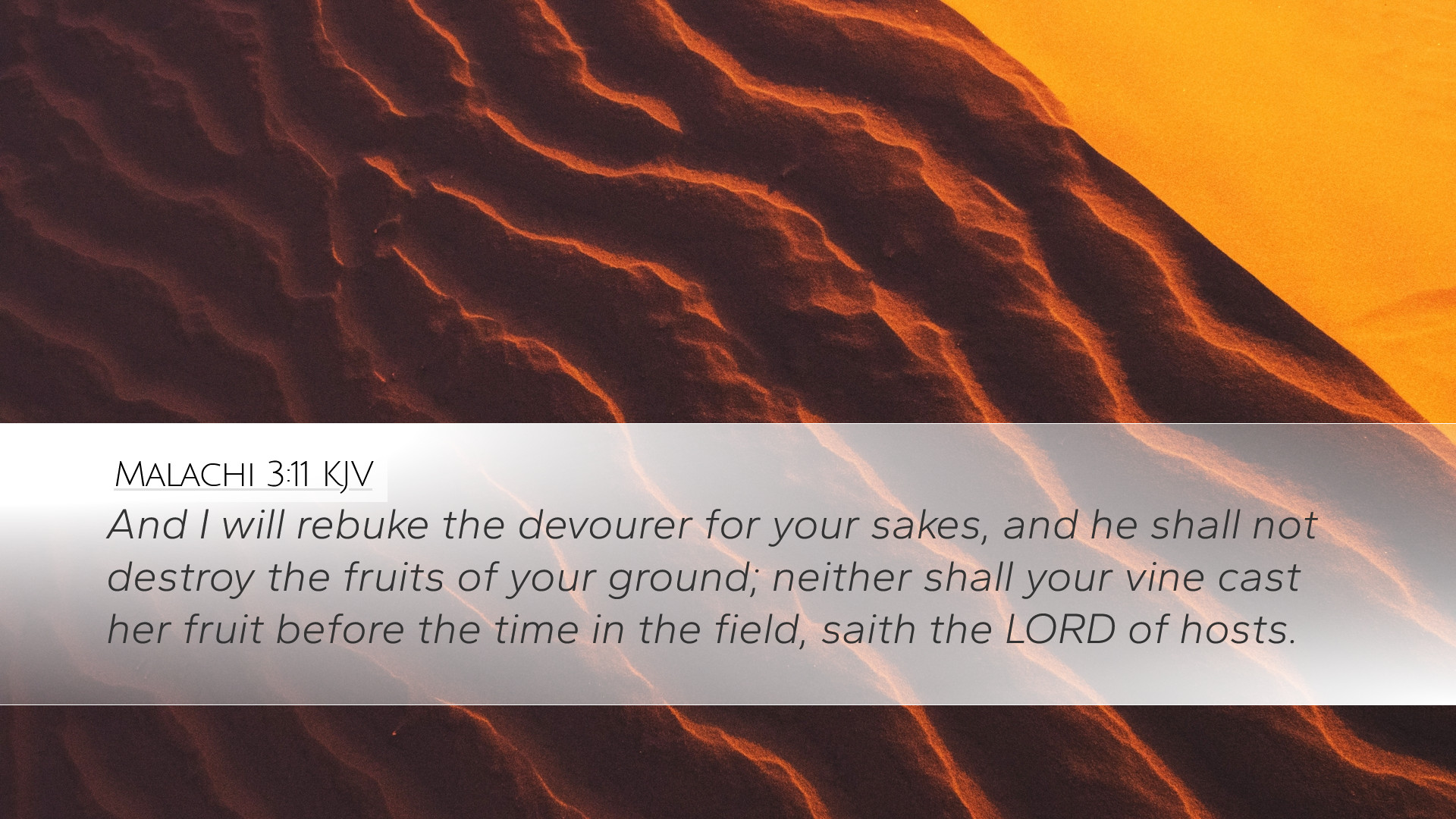Old Testament
Genesis Exodus Leviticus Numbers Deuteronomy Joshua Judges Ruth 1 Samuel 2 Samuel 1 Kings 2 Kings 1 Chronicles 2 Chronicles Ezra Nehemiah Esther Job Psalms Proverbs Ecclesiastes Song of Solomon Isaiah Jeremiah Lamentations Ezekiel Daniel Hosea Joel Amos Obadiah Jonah Micah Nahum Habakkuk Zephaniah Haggai Zechariah MalachiMalachi 3:11
Malachi 3:11 KJV
And I will rebuke the devourer for your sakes, and he shall not destroy the fruits of your ground; neither shall your vine cast her fruit before the time in the field, saith the LORD of hosts.
Malachi 3:11 Bible Commentary
Commentary on Malachi 3:11
Verse: "And I will rebuke the devourer for your sakes, and he shall not destroy the fruits of your ground; neither shall your vine cast her fruit before the time in the field, saith the Lord of hosts."
Introduction
The book of Malachi addresses the people of Israel in a post-exilic context, focusing on their spiritual apathy and the need for genuine devotion to the Lord. In Malachi 3:11, we encounter a profound promise linked to faithfulness in tithes and offerings. This verse encapsulates God’s desire to protect His people from loss and destruction when they adhere to His commands.
The Context of Malachi
Prior to diving into the specifics of verse 11, it is essential to understand the broader context:
- Historical Background: Malachi prophesied during a time when the people of Israel had returned from Babylonian captivity but were struggling with their commitments to God.
- Spiritual Condition: The people exhibited a lukewarm attitude towards worship and sacrifice, questioning God’s justice amidst their disappointments.
- Call to Repentance: Malachi's prophecy serves as a call to return to faithful worship, emphasizing the benefits of obedience.
Detailed Commentary
Divine Assurance of Protection
Malachi 3:11 presents a promise from God—"I will rebuke the devourer for your sakes." Here, the term "devourer" is understood as an agent of destruction, possibly representing pests, disease, or even human adversaries that damage agricultural produce. This assurance reveals God’s active role in safeguarding the interests of those who honor Him.
Interpretations by Commentators
-
Matthew Henry:
Henry emphasizes God's protective covenant and the direct correlation between giving and divine blessing. He elaborates that when God’s people are faithful in their obligations, He promises to intervene in the natural order to ensure the success of their labors.
-
Albert Barnes:
Barnes highlights the agricultural context of Malachi’s audience. By referencing "the fruits of your ground" and the vine not casting its fruit prematurely, he notes the significance of productivity as a sign of God’s favor. Barnes asserts that divine blessing manifests not just in spiritual prosperity but also in physical sustenance.
-
Adam Clarke:
Clarke offers insights into the language of "rebuking" the devourer. He suggests that this verb indicates a specific command or charge against forces that threaten abundance. Clarke also underscores the conditional nature of this promise, which rests on the people’s faithful observance of God’s covenant.
Theological Implications
The promises found in Malachi 3:11 suggest several theological themes:
- Covenant Faithfulness: The passage illustrates the mutual commitment in God’s covenant, where blessings accompany obedience.
- God’s Sovereignty: There is a powerful reminder of God’s sovereignty over creation; He controls both divine and natural realms.
- Assurance in Giving: It emphasizes the importance of trust in God through giving, reinforcing that God honors those who are generous towards His work.
Practical Applications
For modern believers, this verse encourages significant reflections for application:
- Faithfulness in Stewardship: Just as the Israelites were called to bring their tithes, believers today are reminded of their stewardship responsibilities not only in finances but also in time, talent, and resources.
- Trust in God’s Provision: This verse calls for faith that, as we give, God sustains and multiplies our efforts, whether in personal finances or ministry endeavors.
- Spiritual Warfare Awareness: Understanding the “devourer” helps Christians recognize spiritual opposition in their lives, cultivating vigilance and prayerfulness in seeking God’s protection.
Conclusion
Malachi 3:11 serves as a striking reminder of God’s protective promises tied to our obedience and stewardship. As faithful followers of Christ, it is essential to recognize the importance of honoring our commitments to God, with full assurance that He looks after those who prioritize His kingdom. The insights from classical commentaries deepen our appreciation of this profound promise and inspire a commitment to live in a way that invites God's blessings into our lives.


